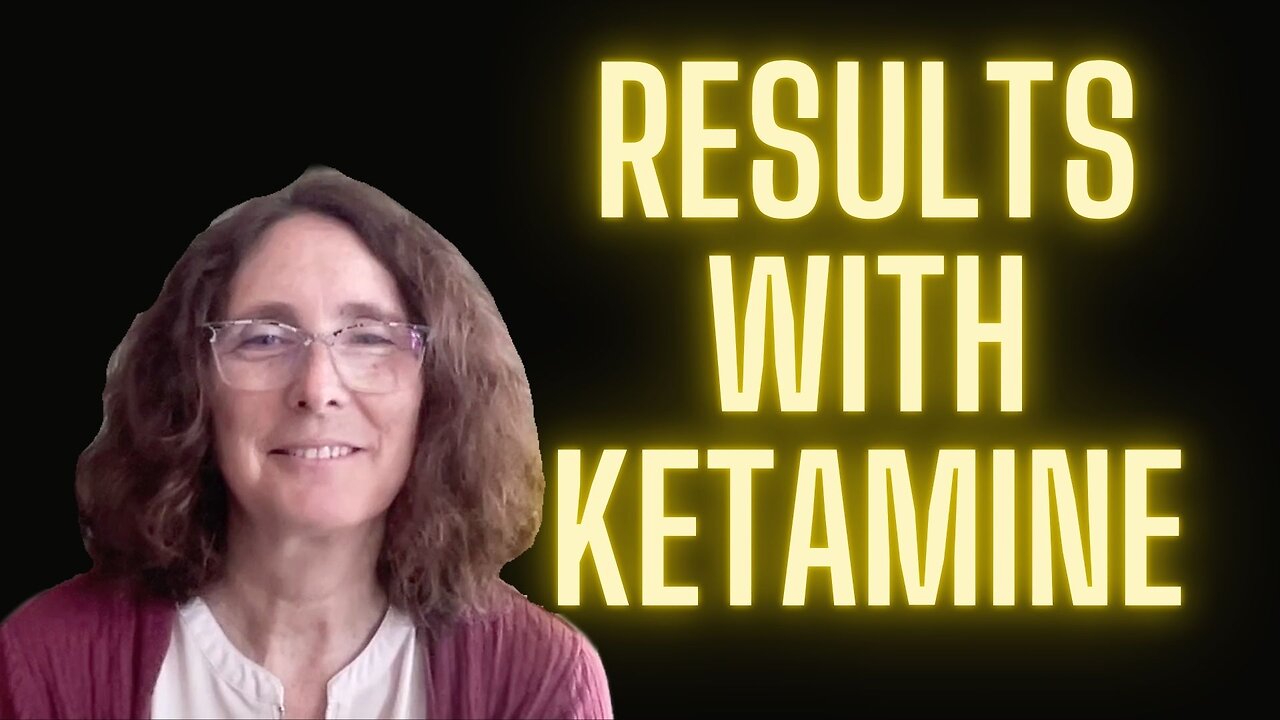Premium Only Content

139. Optimizing Ketamine Dosage for Maximum Benefits. Kyrstal Mize PhD.
Summary
Dr. Krystal Mize shares her personal experience with ketamine treatment for bipolar disorder and posterior cortical atrophy (PCA). She discusses her symptoms, including cognitive decline, visual disturbances, and mood cycling, and how ketamine has helped improve her condition. Dr. Mize also talks about the evolution of her treatment, the dosage adjustments, and the positive changes she has seen in her mood stability, cognitive function, and visual perception. In this conversation, Dr. Krystal D. Mize shares her personal experience with Posterior Cortical Atrophy (PCA), a rare form of Alzheimer's disease. She discusses the challenges she faced with her diagnosis, the impact on her mental health, and the difficulties of caring for her stepfather who also had dementia. Dr. Mize talks about the positive effects of ketamine treatment on her mood stability and how it has changed her life. She also highlights the need for more research and awareness about PCA and encourages early intervention for better outcomes.
Takeaways:
Ketamine treatment has shown positive results in improving symptoms of bipolar disorder and posterior cortical atrophy (PCA).
Ketamine can help stabilize mood, improve cognitive function, and alleviate visual disturbances in patients with PCA.
Dosage adjustments and close collaboration with healthcare professionals are important in optimizing the benefits of ketamine treatment.
Ketamine treatment offers hope and relief for patients who have been treatment-resistant and have struggled to find effective solutions for their symptoms. Posterior Cortical Atrophy (PCA) is a rare form of Alzheimer's disease that primarily affects the visual system.
PCA can have a significant impact on mental health, leading to depression and anxiety.
Ketamine treatment has been effective in stabilizing mood and improving quality of life for individuals with PCA.
Early intervention is crucial for better outcomes in PCA, but awareness and understanding of the condition among healthcare professionals is limited.
More research is needed to better understand the causes and treatment options for PCA.
If you like my t-shirt please get one here:
If you would like to purchase better than grass fed and grass finished beef that will never get mRNA injections, never get growth hormones and never get antibiotics check out mycleanbeef.com/afterhours
As always please like, share and follow.
Please check out my Patreon account (https://www.patreon.com/Afterhourswithdrsigoloff).
This is mostly to help with the legal fees. Please consider contributing but if you are unable to donate money please give prayers.
truthforhealth.org for COVID illness and long haulers syndrome treatment protocols. If you have a vaccine injury (from any vaccine or have any injury that you think may have any relation to any vaccine) please report in their civilian equivalent to VAERS.
Patreon: https://www.patreon.com/Afterhourswithdrsigoloff Email: afterhours@1791.com Instagram: @afterhourswithdrsigoloff Clouthub: @DrSigoloff TruthSocial: @DrSigoloff Rumble: https://rumble.com/c/AfterHoursWithDrSigoloff Youtube: https://www.youtube.com/channel/UCQ_ng3WYVhnctCYq6Rom07g Givesendgo: https://www.givesendgo.com/G37EN
139.Optimizing Ketamine Dosage for Maximum Benefits
===
Krystal Mize, PhD.: [00:00:00] And so my mom actually asked, well what, what is that? What does that mean? And he said, well, she has dementia and she has a young onset, likely Alzheimer's, and it's impacting her visual lobe. I got that diagnosis in 2019, I want to say. I believe it was 2020 when we started the ketamine. I've seen, um, great improvements.
Krystal Mize, PhD.: So I am able to now read a little bit and I had pretty much lost that. And I can now write across the entire paper instead of half the paper. For the first time in my life, really, I feel like my mood is stable. It has changed my, my life. Something's going on beyond just the placebo. I mean, it changed my life simply on the bipolar side, but with the PCA, it's been remarkable.
Krystal Mize, PhD.: It's been something I didn't.
Dr. Sam Sigoloff: If you've noticed, I've been wearing this t shirt for a few episodes now. I have them available on eBay. Check out the links below to get your size. Doesn't dinner sound great as [00:01:00] it's cooking? This dinner is from River Bend Ranch, which always provides prime or high choice.
Dr. Sam Sigoloff: has never been given hormones, never been given antibiotics, never been given mRNA vaccines. It's raised in the USA. It's processed in the USA. In fact, it's fully vertically integrated, which means that they own the cow, it gives birth to the calf, it's raised on their fields, and then taken to their butcher, and then shipped to you.
Dr. Sam Sigoloff: And if we compare, What we can buy from Riverbend Ranch to four other major state companies that sell bundles that have ribeyes and other meat in it. It can be as much as 184 to 59 less expensive. It's a great price value and it's a delicious piece of meat. Check out MyCleanBeef. com slash After Hours That's MyCleanBeef.com/AfterHours, MyCleanBeef.com/AfterHours
Nurse Kelly: Welcome to After Hours with Dr. Sigoloff. On this podcast, you will be encouraged to question everything.
Nurse Kelly: And to have the courage to stand for the truth.
And now, to your host, Dr. Sigoloff.
Dr. Sam Sigoloff: All right, thank you for joining me again. I want to first give a shout out to my Patreon supporters. I've got 2Tough giving 30 a month. I have an anonymous family donor giving 20 and 20 cents a month. I have at the Plandemic Reprimando level, Tai. Charles, Stanley, Dr. Anna, Frank, Brian, [00:03:00] Shell, Brantley, Gary, and Janine.
Dr. Sam Sigoloff: At the 10 level, we have Kevin, and Pat and Bev. At the 5, Refined, Not Burned, there's Linda, Emmy, and Kevin. Joe, Rebecca, Marcus, Elizabeth, Don, Ken, Mary, Rick, and Amanda. Addison Mulder is giving 3 a month, and Frank is giving 1. 50. And then finally, with the Courage is Contagious, at 1 a month, Jay, SpessNasty, Darrell, Susan, BB King, Caleb, and Sharon.
Dr. Sam Sigoloff: I also want to encourage everyone to check out MyCleanBeef. com slash After Hours. That's MyCleanBeef. com slash After Hours for some of the best, better than grass fed beef that I've ever had. Thank you. I want to thank you all for joining me, and I want to thank Dr. Crystal Mize for joining me. So, Dr.
Dr. Sam Sigoloff: Crystal Mize is a PhD in Experimental Psychology, and Dr. Mize has personally benefited from the use of ketamine. She was having a very significant issue with, [00:04:00] with her brain starting to, to waste away, and then she was able to get started on sublingual ketamine, and she's seen the amazing results from that.
Dr. Sam Sigoloff: Crystal, thank you so much for coming on with us.
Krystal Mize, PhD.: Thank you for having me.
Dr. Sam Sigoloff: So, tell me about your experience when you first started noticing symptoms and then what led you to the sublingual ketamine as a possible treatment?
Krystal Mize, PhD.: Well, I actually have a dual diagnosis, so I have really suffered from bipolar.
Krystal Mize, PhD.: Disorder throughout my adult life and, uh, tried just about every treatment there was out there, including electro shock therapy that were electro convulsive therapy. Um, so I was treatment resistant and rapid cycling when I went to see Dr Rachel Wilkinson and, um, I actually saw her for a couple of years before we [00:05:00] started.
Krystal Mize, PhD.: The ketamine. Now, at the same time that I started seeing Dr. Wilkinson, I also started seeing a neurologist, um, Dr. Adams, who has since passed, uh, but was really collaborated with Dr. Wilkinson on the treatment. Um, so when I saw Dr. Adams, I went through, I had probably seen five neurologists with issues because I was having some difficulty with word finding issues.
Krystal Mize, PhD.: I used to teach statistics, and suddenly I was finding that I couldn't do like basic calculations, like if I tried to get up past like 10, so like if I said 14 plus 23. In front of the class. I couldn't do that. And I used to do math for fun as a child. I mean, so I was proficient in it. Um, I, I was a professor of psychology and neuroscience.
Krystal Mize, PhD.: And so I also, [00:06:00] uh, had extensive experience giving lectures and running classes and, um.
Krystal Mize, PhD.: word finding and and then that started coming on I also was finding that I was getting lost in familiar places so for example on my campus where I had gone to grad school and I had taught for five years on the campus after that so we're talking about 10 years on this campus and I would go outside and try to go to a classroom that I had been too many times and I was having difficulty finding the classrooms.
Krystal Mize, PhD.: Um, so I really didn't know what was going on and I went to several neurologists and in fact, at one point, I even said, is it possible that I have like an early onset or a young onset Alzheimer's? And one of the neurologists said, well, you're too young and, uh, which I thought was interesting. I was like, well, [00:07:00] hence the question about the young onset.
Krystal Mize, PhD.: Um, but so sometime later, I would say about,
Krystal Mize, PhD.: Two years after my last encounter with that neurologist, um, I had moved back to where my mother lived in Colorado Springs and she did, uh, see some issues that she hadn't noticed with me living away from her. I lived in Florida, um, and so she helped me get into a neurologist and she went with me. And, um, Dr.
Krystal Mize, PhD.: Adams, was baffled. He really was just baffled. Um, he did all kinds of things, sent me to specialist. Some specialists were saying, well, it's your bipolar. Which by then I was actually having difficulty clear difficulty was seen because the kind of, uh, Alzheimer's or neurodegeneration that I have affects the back part of the brain, which is the visual center [00:08:00] of the brain.
Krystal Mize, PhD.: So I was really not driving at that point because I was having difficulty seeing I was running into doorways. I would go to set something down and miss the table entirely. I was falling off curbs. So I had a couple of concussions just from accidents and falls. Um, I, uh, was having difficulty even doing things like navigating a grocery store, or when I would go into a grocery store, looking at the shelves, I couldn't find the products, um, I, and then, um, really.
Krystal Mize, PhD.: No one put it all together until Dr. Adams, uh, did a volumetric analysis on an MRI and they saw that there was atrophy in my back part of my brain, the [00:09:00] occipital and parietal lobes of the brain, um, and they were finding it was like, I believe it was like two standard deviations below the mean. Um, so they at that point, uh, in the report, it said that I potentially had Benson's syndrome, which is kind of the old name for posterior cortical atrophy.
Krystal Mize, PhD.: Um, so when I went back into Dr. Adams at that point, and again, I was untreated at this point, I wasn't on the ketamine, uh, he immediately started asking me about my vision. Which no neurologist had done. I had people, I went to so many eye doctors and had so many different pairs of glasses because nothing was working.
Krystal Mize, PhD.: And, you know, people just said, well, your vision starts changing as you approach middle age. Um, So no one had put it together, but he asked about my vision. I said, you know, oddly, that's on our list to talk to you about. My mother was there and he asked about some of those [00:10:00] issues. And then he said, well, you know, I've looked at your MRI and I have the report and both the radiologist.
Krystal Mize, PhD.: And I think that there's evidence that you have been since syndrome and. I had heard of it, but I didn't really know what it was. And so my mom actually asked, well, what, what is that? What does that mean? And he said, well, she has dementia and, uh, she has a young onset, uh, likely Alzheimer's and it's impacting her visual lobes.
Krystal Mize, PhD.: So that was shocking. To hear that. Yeah. I mean, it was, you know, it's an interesting thing and I hear this from other people. I actually have a project where I interview other patients who have posterior cortical atrophy or PCA, um, and and their care partners and almost everyone I talked to says, yes, it's a devastating diagnosis, but it's also a relief.
Krystal Mize, PhD.: Because almost [00:11:00] all of these patients have spent five, eight, ten years going from doctor to doctor saying there's something wrong and no one can, can help them. They often get told, well, it's stress or you're depressed or something like that. Um, so to have a doctor say, no, there, there really is something wrong and here's what it is.
Krystal Mize, PhD.: It actually is in some ways a relief because You finally understand what's going on and then you can try to, you know, learn about the condition and try to live your life as fully as possible. Um, so at this time, I, I got that diagnosis in 2019, I want to say. Um, and And again, those basic numbers are difficult for me.
Krystal Mize, PhD.: So I may struggle a little bit with some of the years here. Um, I believe it was [00:12:00] 2020 when we started the ketamine and I actually, uh, Dr. Wilkinson and Dr. Adams. So my psychiatrist and my neurologist had phone calls, they had letters, emails, and they were working together just to try to, you know, help as much as they could and provide support.
Krystal Mize, PhD.: Um, and, uh, I had actually, when I first met Dr. Wilkinson, I think in our first visit, I had heard some stuff about ketamine being used with treatment resistant depressions, and I asked her about it, and at that point, Dr. Wilkinson was still watching what was happening with it. She, you know, is not a doctor that just gives the advice.
Krystal Mize, PhD.: Medications randomly. And so she actually watched it, uh, from the time I met her. Uh, I want to say 2018, maybe, maybe, um, a little earlier. Um, I mentioned it to her. She said, yeah, that's the one. You know, I'm still watching. I'm not going to [00:13:00] start you on that. You've had a lot of reactions to medications. Um, we want to be cautious.
Krystal Mize, PhD.: And so she watched it, and then, um, at some point, after I had my PCA diagnosis, I was starting to have difficulty filling out the forms. At Dr. Wilkinson's office, they do, um, mood, uh, uh, and anxiety measures, like screenings, every, every visit that you go in. And I could no longer fill those out. Um, at one point, when I was trying to even just write my birth date, um, she was looking at the form and she was like, you know, you're, the eight is, is sideways.
Krystal Mize, PhD.: It looks more like an infinity, infinity sign. And I was like, Oh, You know, that's interesting. So at that point, we still were trying to figure out what was going on, but I was starting to lose the ability to read and write. And I was an academic. I actually, because of the PCA [00:14:00] diagnosis and the vision problems and visual spatial issues and going to a neuro ophthalmologist who did all kinds of testing as well.
Krystal Mize, PhD.: I was awarded disability. I was no longer working. I had to step down in 2017 because I felt like I could not serve my students um In my condition and with the symptoms that were coming up that I had no answer Or no explanation so I couldn't figure out how to accommodate So I was on disability and um, I went into dr Wilkinson she saw that and soon afterwards she said, you know, I have started treating some patients with low dose medication Sublingual ketamine, would you be interested in trying and I was like, well, yes, uh, you know, I mean, I'm untreated.
Krystal Mize, PhD.: I'm, I'm cycling rapidly with my bipolar cycles. I'm not working and I'm losing my ability to read and write. What's the worst that can happen? Like, [00:15:00] I, I mean really, you know, like I know I have an early or a young age on onset Alzheimer's. I know the outcome of that and it's coming. And I was attending some support groups online and I was seeing other patients and how they were declining and I thought, yeah, I don't care.
Krystal Mize, PhD.: Anything you can try, I'm willing to try. Um, so we started it. It was, I think every three days. Very low, um, dose, uh, I wanna say it was like even five. ground. So very low dose every three days. And at first I actually had an interesting response to that and I think it was my rapid cycling bipolar, but I'm not positive that the 1st day or 2 when I would take that dose.
Krystal Mize, PhD.: I, I kind of felt a little more stable, but then. Um, by the day before or the day that I needed to take the next dose, I would drop very deeply into a [00:16:00] depression and so it was kind of sending me up and down and I have talked to Dr. Wilkinson about that and very few, if any patients have reported that problem, but I experienced that.
Krystal Mize, PhD.: And so we, uh, did actually start moving me up to every two days and then finally to a daily dosage and also slowly went up on the dosage. So we started on that five milligrams every, um, three days, I believe it was. And I'm currently on, I, we just upped my dose, dosage slightly because you want to hit a sweet spot, um, where, uh, I'm now on 125.
Krystal Mize, PhD.: Every day. And I know from talking to other patients, that's actually lower than many patients 'cause I'm very sensitive to medications. Um, some patients are on 1 75 or maybe even 200. I think that's the most I've heard anyone being on. Um, so I'm on 1 25. I I was on a hundred. [00:17:00] We, we went up to a hundred last year because I was starting to see some improvement in my visual spatial, um, processes.
Krystal Mize, PhD.: Um, and I'm in my mood has been very stable for the last, you know, year, two years. Um, but the visual stuff, I didn't see until we got a little bit higher on the dosage. Um, so, yeah, I have had some improvement in those visual spatial, uh, processes. My word finding difficulties are not as. profound. I can do some basic calculations now, like I can figure out my children's ages.
Krystal Mize, PhD.: I was having difficulty with that. I could like tell you the years they were born, but then I would be like, you calculate it because I couldn't do that. And for the most part, it takes me a little more time, but I can do that now. I still do have some [00:18:00] difficulty with number Numbers, um, and then that word finding.
Krystal Mize, PhD.: I'm, I'm very intelligent. I, I mean, I've published. I, you know, so I've written, um, I'm a big reader. So I'm able to work around some of the word finding issues. But there are times that even just like lecturing about psychology, I may sometimes hit a word where it's just gone, and I have to find a new word.
Krystal Mize, PhD.: And so I do sometimes have some hesitancy in what I'm saying, just because I have to work my way around that. But most people on the outside aren't able to see that. Because, you know, I'm, I'm able to kind of accommodate for it, but that's an improvement. Um, I mean, I stepped down in part because I could not feel like I could give an, a lecture anymore.
Krystal Mize, PhD.: [00:19:00] Um, so, yeah, I've, I've seen, um, great improvements. Um, the other thing, one of my other symptoms that, uh, came on and relatively early with the PCA was that I would have these, uh, I always hate to call them visual hallucinations because people automatically assume that means like a psychotic break type thing, a psychosis, um, but I would have what many people with PCA who experience this, they call it visual disturbances.
Krystal Mize, PhD.: But it in fact is like a hallucination. So for example, I lived in Florida and one time I was riding in a car as a passenger and I just, I saw something on the side of the road and I was looking at it and I just kind of casually turned to the driver and was like, you don't see a polar bear on the side of the highway there, right?
Krystal Mize, PhD.: And of course he was like, no. And it was like, okay, just checking. [00:20:00] Um, so I, I sometimes was seeing, uh, like it was usually animals. That would be there and weren't really there. No one else was seeing them, but I was aware that they likely weren't there.
Dr. Sam Sigoloff: Can I ask you a question about that?
Krystal Mize, PhD.: Yes.
Dr. Sam Sigoloff: Are you familiar with Charles Bonnet syndrome?
Dr. Sam Sigoloff: It's a issue with macular degeneration. Is, is your hallucination, your visual disturbances, anything like Charles Bonnet syndrome?
Krystal Mize, PhD.: So my visual disturbances are not actually related to my eyes at all. So my, I do have some difficulty with the muscles in my eyes. And I actually think it's developed in part because my brain is trying so hard to see everything that it sometimes forgets to hold my eyes straight.
Krystal Mize, PhD.: So they have tried like prisms and stuff, which don't work for me. Um, but my eyes, I actually have almost 20, 20 vision. It's, [00:21:00] it's my brain. It's not my eyes. It's the interpretation of the information. So, uh, there's nothing going on with the eyes or, or the, you know, all of that's been found healthy.
Dr. Sam Sigoloff: Okay, I guess with the Charles Bonnet syndrome, it's when the eye can't see, the brain just puts things in there to fill that space, I think, is what it seems like.
Krystal Mize, PhD.: Yeah, and I think that's kind of what's going on, but again, my eye is seeing it. It's my brain that's not, and I think it's the same kind of phenomenon where, um, You know, my visual, what, what I'm seeing, there are kind of blank spots. Like, I don't, I at least didn't have very good visual, uh, peripheral vision.
Krystal Mize, PhD.: Um, again, with the higher dose of the ketamine, that seems like it's coming back a little bit. Yeah. Um, and that's recent. That's only since we, uh, have gone up to that, uh, 100 and then just [00:22:00] recently went to the 1 25 when we saw that, that improvement. Um, where it does seem like some of my peripheral is coming back, but because there would be these kind of black spots or I would be looking and trying to find something and like I knew I just put my cup down and now I can't find my cup.
Krystal Mize, PhD.: Uh, I think my brain does try. To fill in things, but it really is not the eyes. They've done everything they possibly can to test the eyes. It is the brain. So, yeah, I think it's the same process that as the there's, uh, you know, loss of cells, uh, in the brain that there there's just these kind of black spots or blank spots and your brain tries to.
Krystal Mize, PhD.: Fill it in. And so it often is animals, which I kind of think is like an evolutionary benefit. Like, if you can't see something, but you think something might be there, maybe it's an animal. And so maybe you need to be aware. So, like, I saw the [00:23:00] polar bear, I've seen, like, kind of like mountain lions, like, you know, my sidewalk snakes all over the ground and I actually have a guide dog.
Krystal Mize, PhD.: I, I've worked with a dog that we've trained to be a guide dog for me. And part of what I would do is I actually would say, you know, Tika, look, and as I'm pointing to her where I'm seeing stuff and she's trying to look, if she's looking back up at me, like, yeah, there's nothing there, mom. Then I know it's not there.
Krystal Mize, PhD.: If she, like, if there actually is a snake there, she's going to respond to that. So like, I saw the mountain lion kind of laying right on the other side of our, our patio, um, almost like right next to her and she was not responding. So I was confident it was not there. Um, and now I still am seeing it. Until I'm not and, um, but I know that I can go about my business.
Krystal Mize, PhD.: So again, [00:24:00] I'm very aware of it. And I've heard that from other people too. Now, my understanding is that as it progresses, often people will then actually start seeing other people. I did see people pop into my uh line of vision so Like for a while my sons were living with me or when my mom's around I may not know they're actually in the area and then all of a sudden it's like they're coming It's almost like a time space continuum break like they break through In and suddenly they just pop pop in to you know pop in to the room.
Krystal Mize, PhD.: Um That has decreased also. I haven't experienced that And, uh, I want to say six months. I haven't had that, and that was continuous for, for years, uh, as this was declining and it was getting worse. So
Dr. Sam Sigoloff: The animals that you see, are they typically only predator animals?
Krystal Mize, PhD.: [00:25:00] Typically, which again is why I'm an evolutionary psychologist.
Krystal Mize, PhD.: That's my, my, uh, passion. And so I really do kind of think it is almost like the brain is, it's, it's an alert system. Like you're seeing something, we don't know what it is. It might be this. It's like it's kind of You know, the shadows or whatever, it seems like it might be this, so yeah, it's almost always predator type animals.
Krystal Mize, PhD.: It's not like a, you know, a cuddly little puppy that I'm seeing.
Dr. Sam Sigoloff: It was interesting. It's really interesting.
Krystal Mize, PhD.: Yes.
Dr. Sam Sigoloff: You're not seeing cows laying around. You're seeing lions.
Krystal Mize, PhD.: Yes. Yep. Lions and bears and tigers. Yes. And snakes. Yeah. Which I kind of have a phobia of snakes, so that one was difficult.
Dr. Sam Sigoloff: So how did you determine when to go up on the dosage? Was it when you saw more results and then you went up and did you ever have to drop back down?
Krystal Mize, PhD.: I actually have never had [00:26:00] to drop back down. Um, it was always, of course, in consultation with Dr. Wilkinson. And by the way, my neurologist, uh, he was open to this.
Krystal Mize, PhD.: He even said just like me, like, what do you have to lose? Like, it's only going to get worse, so, and there's nothing I can do, so let's, let's let Dr. Wilkinson try. Um, so it was in consultation with Dr. Wilkinson, um, just, you know, going in and saying, well, my mood seems a little more stable, but not.
Krystal Mize, PhD.: Completely yet. And so maybe, maybe I need a little more. And so we would try it. We'd go up just again, very slowly and small amounts. Um, and then once we started seeing the visual perceptual changes and, um, I can now read and write, uh, but to read, I actually have to block out the text for the most part.
Krystal Mize, PhD.: So like when they do an eye exam for me and you have kind of that, um, um, I can't think of the chart. [00:27:00] The, yeah, yeah. The array of letters. I can't read a full line. I may see part of a line and then the letters are jumping around and then they're gone. Like they're there, they're gone. And so, uh, it wasn't until actually just about a year and a half ago that an eye doctor went, oh, well, we keep going bigger.
Krystal Mize, PhD.: And by the way, when you go bigger with someone who has PCA, they're less likely to be able to make out the letters. You have to go smaller. Because when there's a bigger, uh, image. Their brain can't put all the pieces together. So when you go smaller, but then you isolate it. So, uh, in my last eye exam, the doctor put one letter again at that kind of 20, 20 vision, um, she put one letter and I was able to make it out.
Krystal Mize, PhD.: So when I'm actually reading on a paper, I, or like trying to sign something for credit card or something, I have to actually block it out with my hands [00:28:00] and isolate the text. And just kind of move around that way and there are some Uh little colored strips That you can actually put over text that does that for you They look like little rulers, but they have colored film in them and they come in different colors And so I can use that or I I find find that it's because I read so fast it's actually easier for me to just use my hands to block it out.
Krystal Mize, PhD.: So I am able to now read a little bit and I had pretty much lost that and I can now write across the entire paper instead of half the paper. So I don't know if you've ever seen that clock drawing that test that they do where, um, uh, someone may actually just start putting the numbers on one side, like I definitely had that going on.
Krystal Mize, PhD.: Um, and now I do actually see the entire page and can. Right with it with a dark marker, um, you know, so special or [00:29:00] really like, like I use a real kind of brilliant blue pen. If I do have to use pen pencil, I'm probably not gonna be able to see it.
Dr. Sam Sigoloff: Have you ever neglected one side of your body?
Krystal Mize, PhD.: A little bit.
Krystal Mize, PhD.: So again, be when we first started the ketamine, I was starting to have difficulty getting dressed and that's part of that too. Um, so like finding left and right. Uh, and I still struggle with that a little bit, but, um, I can. I sometimes get my clothes on backward or inside out still, but I can get dressed.
Krystal Mize, PhD.: I was really starting to struggle having or having difficulty getting dressed. Or things like setting the table. I just couldn't put all the pieces together. And again, after we started that ketamine about nine months in was when we really started seeing some improvements on these things beyond the mood.
Krystal Mize, PhD.: So, um, yeah. It's been amazing.
Dr. Sam Sigoloff: That is [00:30:00] amazing. And let's go into your mood some, because you were saying you had some bipolar symptoms that were cycling back and forth fairly quickly.
Krystal Mize, PhD.: Yes.
Dr. Sam Sigoloff: And that can be a difficult diagnosis to carry for people because they do things when they don't want to, and they don't do things when they don't want to also.
Krystal Mize, PhD.: Yes. Yeah. I mean, for me, I think the biggest I mean, before the rapid cycling started, and I think the rapid cycling came on because we couldn't control it. I was on lithium. I developed kidney damage. I was on every possible combination of medications. And I always had some severe. Reactions to them. And so I wasn't treated for a long time.
Krystal Mize, PhD.: And I think that started the rapid cycling. Um, and then, like I said, we did actually try, uh, ECT and that was awful. That just, it works for some people. So it's a miracle for some people. It was not for me. Um, so, uh, [00:31:00] yeah, I think my mood got to where it was cycling pretty rapidly. Um, sometimes within a week, you know, just.
Krystal Mize, PhD.: Up and down, up and down. And my depression got more severe. I actually had more of the hypomania throughout most of my life, which in some ways made me productive because, you know, I was a professor. So the beginning of the semester, I'd get kind of hypomanic, very focused on what I was doing, get all of my class prep done, or at the end of the semester, get all my grading done.
Krystal Mize, PhD.: But there were times that like, you have no filter. Like I already have difficulties with filter, but you know, people will say things and it's like, Everyone's a moron. There's nothing going on with me. It's everyone's a moron, you know, um, and I mean that became a cue for me like because I normally don't call people a moron, but if I started saying, oh, well, he's a moron, she's a moron, everyone's a moron, you know, it's like, oh, yeah, I must be a little [00:32:00] hypomanic.
Krystal Mize, PhD.: Maybe it's time to withdraw a little bit and protect the And then I would get, um, uh, irritable. Uh, there's an irritable stage people think of it as just depressed and and manic and or you know hyper manic um, I Would get irritable. So I was usually hypomanic Or irritable when I was writing my master's thesis.
Krystal Mize, PhD.: I did all the research But I actually wrote the thesis in one weekend and it was because I was in a hypomanic state And like I wrote it. I defended it like I spent several years reading but I actually didn't write it until That weekend and that I mean so again it I I kind of saw it as an occasional superpower But then there were the downsides that occasionally I would get depressed.
Krystal Mize, PhD.: Um, when I was struggling, when I had to quit [00:33:00] work, when I was losing my ability to read and write, when I could not trust. Myself, my, my own brain on what I was seeing, I did get kind of depressed. Um, so I had more depression in those years that Dr. Wilkinson was seeing me because I got that diagnosis soon after I started seeing her.
Krystal Mize, PhD.: Um, and I had just recently quit my job just the year before. And I thought, you know, it's, it's only going to get worse. So I was definitely having some depression. And then also at the same time that all of this was going on, um. My stepfather, who, uh, I, I was very close to, who's a wonderful man, um, he, I had seen some symptoms of like Alzheimer's or dementia in him for, for many years, but, um, in around that same time, right around the same time that I got my diagnosis and I started seeing [00:34:00] Dr.
Krystal Mize, PhD.: Wilkinson, uh, he had a fall. and cracked his back. And when he came out of the rehab facility, the dementia had really progressed. He had vascular dementia and then also some Alzheimer's. And so, uh, he ended up going into in home hospice care. And my mother was his 24 7 caregiver and I lived right there next door.
Krystal Mize, PhD.: Near her or sometimes in her home. And so I was helping to take care of him the best I could. There were things I couldn't do safely with my visual perceptual issues. Um, he would ask me to read to him and I, you know, cause he never remembered that I couldn't read to him. Um, and I, so then we sometimes I had to explain to him sometimes, you know, what my condition was.
Krystal Mize, PhD.: So it was very difficult because I was seeing kind of those end stages. of dementias. And I knew that I, although it's hitting my visual system now, the prognosis is that if you live long enough, it's going [00:35:00] to look more like a traditional Alzheimer's in the end. And so I, I saw what was coming and that was very difficult.
Krystal Mize, PhD.: And then just the loss of him, of that fabulous person, you know, cause it's kind of like the person is dying before. They're gone, and so you're losing them, and so I was facing that on a daily basis also, and so that was causing some depression, of course, that, you know, just the struggles with him, watching my mom have to deal with that, and then having, watching my mother have to deal with my own diagnosis, I mean, being told your daughter has, has a dementia or an Alzheimer's, and seeing me go from being very productive and successful, Yeah, as an experimental psychologist and professor to not being able to always dress myself or, you know, do my shopping or all of those things.
Krystal Mize, PhD.: It was very difficult [00:36:00] on her. And then I have three sons. And having to tell them my diagnosis and what was going on was one of the hardest things I ever had to do. And of course they were scared and, you know, still, I think it's difficult on them because they saw me so successful and then to decline. So young, you know, much earlier than they ever expected, of course.
Krystal Mize, PhD.: So, uh, definitely was having some depression with that. Now I think it's understandable, but because I have bipolar, it would, you know, start those cycles. Um, but now with the ketamine, um, in my last visit with Dr. Wilkinson, which was just a couple of weeks ago, um, I actually think I had like a score of two on the depression inventory and maybe no anxiety.
Krystal Mize, PhD.: Yeah, yeah. So, and that, I [00:37:00] mean, I was always either profoundly depressed or I was high because I was having those, those manic symptoms. Um, so yeah, that, that's been amazing for the first time in my life, really. I feel like my mood is stable and that it has changed my, my life as well because now I'm not as afraid that I might hurt someone when I don't mean to, or, you know, hurt someone.
Krystal Mize, PhD.: And I'm, when I don't mean physically, I mean, say something. Um, just because I'm irritable or because I feel like everyone's a moron and you should know this. And, um, you know, so just that, that's, it's not pleasant to live with someone who has bipolar. And so just knowing that I'm not likely to, to behave in a way that is really unlike who I am as a person when I'm stable.
Krystal Mize, PhD.: So that's been remarkable also. [00:38:00]
Dr. Sam Sigoloff: Is there any risk that your children could inherit some of this issue?
Krystal Mize, PhD.: Well, so bipolar is very heritable. Um, I think schizophrenia, uh, has a higher heritability, uh, rate, but bipolar is also very high up there. So, uh, yeah, bipolar definitely runs in my family. And so, of course, there was that risk with my children.
Krystal Mize, PhD.: It's something I didn't fully understand when I had my children, I have to say. Um, you know, so I feel bad that they have those genes and those risks. Um, as far as the PCA, there is no evidence in the research that PCA is an inherited disease. Uh, condition. So I know that some Alzheimer's, there isn't, there are some variants that are inheritable, uh, but it doesn't seem like this one is.
Krystal Mize, PhD.: With a little bit of research that's been [00:39:00] done on it, it's very under researched because it doesn't affect as many people, or it's not known to affect as many people as a traditional Alzheimer's variant. And then I would also mention that, uh, PCA has also been linked to Lewy body. Dementias and so it depends on the doctor that you talk to.
Krystal Mize, PhD.: Some doctors say no, it's, it's Alzheimer's. And then some people also get Lewy dementia, Lewy bodies, dementias. Um, but other people don't seem to show the evidence of the Alzheimer's. But then when they do the autopsy, they're finding the Lewy bodies, or they're having symptoms that are more in line with Lewy bodies and, and having those earlier visual disturbances or, you know, seeing animals, um, that seems at least in all the people I've talked to who have been Lewy body dementia or [00:40:00] suspected because it's until they have their autopsy.
Krystal Mize, PhD.: You don't know for sure at this point, um, but it's suspected that they have the Lewy bodies variant. Those are the ones that have those visual disturbances earlier. Some people get it later in the condition with just the Alzheimer's. So, uh, those two things, there's no evidence, my children. We'll inherit it just from a little bit of research that's out there.
Dr. Sam Sigoloff: And is there a known cause for PCA?
Krystal Mize, PhD.: Again, it's, it's, uh, they, they say every, anywhere between like, I think it's like 78 to 98%, depending on the study you read, are suspected to be Alzheimer's. Um, and then the others, it's, it's Lewy bodies would be the second highest. But again, the research is shifting quick, quickly.
Krystal Mize, PhD.: Because, um, they're starting to [00:41:00] be able to identify Alzheimer's without doing that autopsy a little more, uh, you know, uh, directly. The Lewy bodies isn't quite, they're not as far along on that research, uh, but Alzheimer's is the, the underlying disease, underlying pathology. Okay. For most patients, probably all, but most again, it depends on which doctor I am.
Krystal Mize, PhD.: I'm interviewing in my study. Okay. Yeah.
Dr. Sam Sigoloff: So a lot more research needs to be done in this field, obviously. Oh,
Krystal Mize, PhD.: definitely. Yes. And actually my research. So, uh, so by the way, I did go back to work, um, after about nine ketamine when I was starting to have a little more stability. Okay. Starting to feel more confident working with my guide dog, I, and, you know, was starting to be able to maybe piece together a little bit on my reading, but I also learned some tools like audio, uh, [00:42:00] you know, books and, uh, speech to, to text to help me write.
Krystal Mize, PhD.: Um, I started thinking, well, maybe I could try to go back to work and so I applied for some jobs and I got an interview in Florida and, um, got hired. And I've actually, I'm going into my third year back, uh, as a professor and I'm very successful right now. Um, yes, Dr. Adams, my neurologist, he gave me two years, two to three years.
Krystal Mize, PhD.: He said, you know, I think you could probably get through two to three years. After that, the decline will probably be. You know, it'll be declining and you'll probably have to quit again. But he encouraged me to do it. Dr. Wilkinson encouraged me to do it. Actually, all my doctors except for the, um, uh, neuropsychologist who did the evaluation encouraged me to try to go back to work.
Krystal Mize, PhD.: [00:43:00] And, um, you know, I'm getting through. It takes me a lot longer than it used to. But I am getting through and I'm working with students. So one of the things we're working on is a project on PCA, where we are interviewing patients and their care partners and also medical professionals who have either experience or expertise of working with patients who have PCA, and we are interviewing them.
Krystal Mize, PhD.: This was actually a project that people in my support group who have PCA and their care partners asked me to do, because Most of them cannot read or write at all anymore, the patients, and, but they're very aware of what was going on, and they felt like there needed to be more information out there from the patients and their perspective, because people ask the care partners to be involved in research, but other than, like, uh, medical trials, the patients don't get asked about their [00:44:00] perspective, their experiences very often.
Krystal Mize, PhD.: So, they asked me to be their voice. And so it's again taking me a little longer But I have put together a project where i'm doing interviews on zoom with patients and care partners and letting them share their experience and we're putting those together into educational outreach efforts and Giving like we have a big talk my students and I have a big talk this semester at my university that we're going to try to um Uh, actually promote outside the university as well, invite people to attend via zoom and we're starting to give, you know, research conferences.
Krystal Mize, PhD.: We do offer to go in and give, uh, guest lectures and classes, uh, things like that to, uh, spread the word about what PCA is.
Dr. Sam Sigoloff: That's absolutely incredible. Are you in these PCA groups? And when you meet these patients, do you explain to them about ketamine at all? [00:45:00]
Krystal Mize, PhD.: You know, my support group, the support group, um, when I first started on it, I mentioned it and I mentioned I was having some benefits.
Krystal Mize, PhD.: The people who run the support group, uh, were very,
Krystal Mize, PhD.: they, they didn't see any way that it could be doing anything. And so they felt like it was maybe a placebo effect. And which I understand, I actually at first thought it was a placebo effect too until my mom came running in with a piece of paper that I had written on and I had actually written and I was like, oh, yeah, I was trying to because I would try to write, you know, try to make a list.
Krystal Mize, PhD.: No one could read it and I couldn't read it, but she came in. She's like, you made a list and I can read it. And, and, you know, at that point, I was like, something's going on beyond just the placebo, um, effect. So I, I have shared with them. Now, here's the sad thing. I think that [00:46:00] I got diagnosed earlier because I have training in psychology and neuroscience.
Krystal Mize, PhD.: And I understood earlier that something was going on and I had a great support system with my mom to help me get that diagnosis. Um, I am pretty confident that Dr. Wilkinson would say this as well, that for this kind of condition, I really think you have to start it early. And we're seeing that with some of the Alzheimer's treatments, that it's, it can slow down the progress, progress of the, the, the, Disease.
Krystal Mize, PhD.: Um, but only if it started early. And so most of the patients that I encounter, they're too far along and they're also older. I, I developed it very early. My first symptoms were coming on in my early forties and. Um, I'm 50 now, so I caught it in those first 10 years, I would say, of, [00:47:00] you know, from the symptom onset naturally earlier, uh, about 7 years, um, and many of these patients, uh, developed it in their 50s or early 60s, and now they're in their, you know, maybe late 60s or 70s, and I think it's progressed too far.
Krystal Mize, PhD.: I don't know that ketamine is that much of a miracle, unfortunately. Um, I did have one care partner who did actually, um, share my story with their doctor, uh, their neurologist. And the neurologist was willing to try it. I think he actually maybe even called Dr. Wilkinson and talked to her about it. And that patient did go on it, but she was significantly further along than me.
Krystal Mize, PhD.: She was already having some significant memory. Issues, not just the visual spatial issues, and I don't think they saw [00:48:00] any real effect with her, unfortunately. So, it is 1 of those early, you have to catch it early and to catch it early, you have to be aware of it. And many doctors have heard of it, but it's not something they think about
Krystal Mize, PhD.: even neurologist. I'm finding, so yeah, so unfortunately.
Dr. Sam Sigoloff: To any patient out there that's thinking about doing this for whatever neurologic, neuropsychogenic issue they have going on, what Advice or what, um, recommendations would you give them? Look into it. Don't look into it. Um, think about it long and hard because there is some significant benefits.
Krystal Mize, PhD.: Oh yeah. I mean, I have not had any significant, if any, side effects. Um, [00:49:00] and that's unusual. I've had side effects to everything I've ever been on. I, I can't take Benadryl. Because I have a reaction to Benadryl, um, or, or, you know, cough medicine. Um, so, uh, I, I haven't had any real side effects, so I think it's very beneficial.
Krystal Mize, PhD.: Now, that being said, don't go out on the street and buy ketamine, you know, don't, don't do that. Um, this is, uh, formulated in a pharmacy. From my research, I think that the sublingual ketamine is the best Method of administering it. I haven't tried the infusion. I don't think the infusion would be a good choice for me.
Krystal Mize, PhD.: Um, they give it to you and then you are off it for, you know, it depends on the clinic that I've talked to, but a week or two weeks or whatever. And then you may have another infusion. Again, I think it works sometimes for some patients. Personally, with my [00:50:00] experience of that going up and down with the bipolar, I wouldn't recommend that.
Krystal Mize, PhD.: I don't think Dr. Wilkinson recommends the infusion therapies. Um, and then I know you can also do like a nasal spray. Again, I, I know less about that. Um, the sublingual though, I think has been very beneficial. I'm able to take it at home. Now I've never had any desire to take more. Um, I actually don't like the way it makes me feel.
Krystal Mize, PhD.: I don't know why it's a party drug. I really don't, because I don't like the way it makes me feel. I mean, I'm taking a very low dose and I make sure that I'm in bed when I take it. And for about 30 minutes afterwards, I just feel off. Um. Not, I mean, I just like, I'm not very stable, like I'm afraid I might fall if I get up, but after that, I'm fine, um, you know, and so I take it before bed, um, and, and [00:51:00] that's the only effect, I mean, negative kind of effect I've had.
Krystal Mize, PhD.: Um, I think some doctors do worry about giving it to patients to take home. I think if you talk to Dr. Wilkinson, I don't think, and some of the other doctors that she's worked with, I don't think they have a problem with their patients taking more than they're supposed to. You know, I, I'm, I don't feel like I am addicted.
Krystal Mize, PhD.: Um, I have to actually, I actually have a, a timer on my phone to remind me to take it just because I do think you need to take it every day. Um, and on at the same time, um, So I recommended, I mean, I really thought that by this point, I would not be recognizing people with, with, you know, the neuro degeneration, the PCA.
Krystal Mize, PhD.: And I have never been stable mood wise in my adult life. [00:52:00] I've tried everything else and had reactions to everything. Um, so this really was, I mean, it changed my life simply on the bipolar side. But with the PCA, it's been remarkable. It's been something I didn't expect.
Krystal Mize, PhD.: I, I think that with the PCA, I, I'm not, I'm still not a full believer that it's, it's in the sense of that it's, it's um, that it, that it's gonna have, I'm afraid the PCA or the disease, the underlying disease is gonna, uh, start. Becoming too much for the ketamine to fix because when I do see those visual spatial things [00:53:00] or the word finding things, when I see some or like calculations, when I do see benefits there, I'll see benefits and then, like, in a month or 2, it'll feel like I'm kind of sliding a little bit.
Krystal Mize, PhD.: Like, there's a decline. It may be exactly where. I felt like there was a benefit or maybe someplace slightly different, you know, in, in that visual spatial system. And so I do feel like my brain is constantly, there's a battle in my brain between the ketamine and the effects of the ketamine and the, the underlying disease.
Krystal Mize, PhD.: I'm not sure Dr. Wilkinson would agree with me. I think she's very optimistic that maybe we're going to. You know, kill this. Um, so again, I, I, I'm a little more, I, I hope so, but I also, um, I, you know, it's very difficult when I start seeing [00:54:00] those slides, because I know that once I start sliding, especially because it came on early on in life, it can slide very quickly.
Krystal Mize, PhD.: And so anytime there is a little bit of a slide, I worry, um, that maybe it's starting to progress and it's starting to become too much for the ketamine. As far as the mood disorder, I think it really is just a miracle treatment. With that, um, uh, you know, and I, and maybe I am just kind of trying to protect myself because when you know you have an Alzheimer's diagnosis, you know, the prognosis or, or a Lewy body, you know, you know, the outcome.
Krystal Mize, PhD.: And so maybe I am trying to protect myself there, but I think that also makes me a good patient and a good reporter to Dr. Wilkinson of like, when I'm saying there's improvements. There probably are really improvements because I'm shocked when there's improvement.[00:55:00]
Dr. Sam Sigoloff: And to the
Krystal Mize, PhD.: naysayers who say,
Dr. Sam Sigoloff: it's ketamine, it's this dangerous drug, didn't Matthew Perry die of this? He also took it in a pool, which is incredibly dangerous to do.
Krystal Mize, PhD.: And if, if I remember correctly, I think I just saw something recently that he had had like three doses of it. I think infusions. Um, like the day he, he, you know, was found dead.
Krystal Mize, PhD.: Generally, when you hear about people who are dying from it, it's because they are misusing it. They are, uh, and they misuse other drugs. You know, this is a medication. I mean, you can overdose on Tylenol. You know, if you take too much or water for that matter. Um, so no, I, I really think that if it's used under doctor supervision, all of my doctors are aware I'm on it.
Krystal Mize, PhD.: I often get questions by other [00:56:00] doctors of why are you on this? Um, You know, and, and they, they question it. Um, but, uh, using it under medical supervision, I think it's, I don't think there's a risk to it. I feel comfortable enough. recommending it to my friends and family if I see something they may benefit from it.
Krystal Mize, PhD.: So yeah, and it's also not destroyed my kidneys. I mean, you know, I have that kidney dysfunction from lithium. So, uh, yeah.
Dr. Sam Sigoloff: Well, Dr. Crystal, thank you so much for sharing your story, telling us all about your experience. Um, This has been amazing. This will hopefully help open the door in some people's minds to be able to get treatment that they may desperately need.
Krystal Mize, PhD.: Yes, [00:57:00] you're welcome. And, um, I'm always happy to share my experience and to answer questions from a patient perspective. And then because I do have some training in psychology and neuroscience, I also have a little added, uh, understanding of what's going on. So,
Dr. Sam Sigoloff: well, thank you very much. Thank you
Krystal Mize, PhD.: very much.
Dr. Sam Sigoloff: God bless you.
Dr. Sam Sigoloff: Just a reminder for everyone out there. Thank you. In duty uniform of the day. The full armor of God. Let's all make courage more contagious than fear.[00:58:00]
Dr. Sam Sigoloff: Doesn't dinner sound great as it's cooking? This dinner is from Riverbend Ranch. Which always provides prime or high choice. Has never been given hormones. Never been given antibiotics. Never been given anything. mRNA vaccines. It's raised in the USA. It's processed in the USA. In fact, it's fully vertically integrated, which means that they own the cow that gives birth to the calf.
Dr. Sam Sigoloff: It's raised on their fields and then taken to their butcher and then shipped to you. And if we compare to What we can buy from Riverbend Ranch to four other major state companies that sell bundles that have ribeyes and other meat in it. It can be as much as 184 to 59 less expensive. It's a great price value and it's a delicious piece of meat.
Check out MyCleanbeef.com/afterhours. That's mycleanbeef.com/afterhours, mycleanbeef.com/afterhours.
-
 57:59
57:59
Dr. Sigoloff
7 months ago143. Clotting Phenomena: A New Normal? with Tom Haviland
2.03K16 -
 LIVE
LIVE
Wendy Bell Radio
4 hours agoDemocrats Need Fake Data To Cover Up Their Incompetence
3,795 watching -
 LIVE
LIVE
The Bubba Army
22 hours agoImmigrant Truck Driver.. Who's To Blame?! - Bubba the Love Sponge® Show | 8/20/25
17,268 watching -
 LIVE
LIVE
JuicyJohns
41 minutes ago🟢#1 REBIRTH PLAYER 10.2+ KD🟢
66 watching -
 32:50
32:50
Uncommon Sense In Current Times
18 hours ago $0.20 earnedIs War Ever Just? Frank Turek Explains Just War Theory & Christian Ethics
10.4K3 -
 25:57
25:57
DeVory Darkins
1 day ago $16.98 earnedNewsom suffers HUMILIATING SETBACK after FATAL Accident as Trump leads HISTORIC meeting
40.6K139 -
 LIVE
LIVE
FyrBorne
12 hours ago🔴Warzone M&K Sniping: First Impressions of Black Ops 7 Reveal
244 watching -
 8:16
8:16
MattMorseTV
17 hours ago $9.24 earnedTrump’s name just got CLEARED.
82.5K84 -
 2:01:55
2:01:55
MG Show
22 hours agoPresident Trump Multilateral Meeting with European Leaders; Trump Outlines Putin Zelenskyy Meeting
32.4K25 -
 LIVE
LIVE
DoldrumDan
3 hours agoCHALLENGE RUNNER BOUT DONE WITH ELDEN RING NIGHTREIGN STORY MODE HUGE GAMING
65 watching